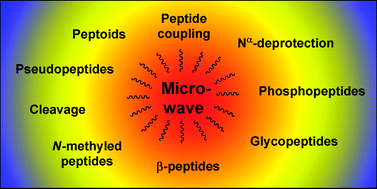Microwave heating in solid-phase peptide synthesis
Abstract
The highly refined organic chemistry in solid-phase synthesis has made it the method of choice not only to assemble

* Corresponding authors
a
University of Copenhagen, Faculty of Life Sciences, IGM, Section for Nanobioscience, Thorvaldsensvej 40, 1871 Frederiksberg C, Denmark
E-mail:
kjj@life.ku.dk
The highly refined organic chemistry in solid-phase synthesis has made it the method of choice not only to assemble

 Please wait while we load your content...
Something went wrong. Try again?
Please wait while we load your content...
Something went wrong. Try again?
S. L. Pedersen, A. P. Tofteng, L. Malik and K. J. Jensen, Chem. Soc. Rev., 2012, 41, 1826 DOI: 10.1039/C1CS15214A
To request permission to reproduce material from this article, please go to the Copyright Clearance Center request page.
If you are an author contributing to an RSC publication, you do not need to request permission provided correct acknowledgement is given.
If you are the author of this article, you do not need to request permission to reproduce figures and diagrams provided correct acknowledgement is given. If you want to reproduce the whole article in a third-party publication (excluding your thesis/dissertation for which permission is not required) please go to the Copyright Clearance Center request page.
Read more about how to correctly acknowledge RSC content.
 Fetching data from CrossRef.
Fetching data from CrossRef.
This may take some time to load.
Loading related content
